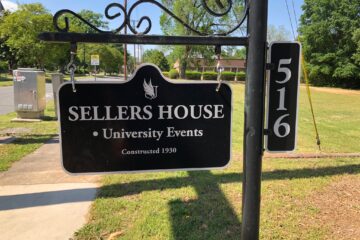Diagnosed with Spastic Diplegia Cerebral Palsy when she was 18 months old, sophomore mass communication major Ainsley McCarthy took to Instagram on Sept. 5 to share an informative and heartfelt message, bringing attention to the lack of awareness and issues regarding disability services on campus.
McCarthy showed many pictures of evidence of some of the constructional issues of the services that are provided for disability issues on campus.
“Broken elevators. Cracked, uneven ramps,” she wrote. “Finicky push buttons, outside doors which are adhered to the wall with tape, or sometimes no push button at all.”
McCarthy’s post gained much sympathy and attention from fellow students around the school, and many even shared their own personal experience and frustrations with the issues of disability access on campus.
“I had started using a wheelchair when I came to college because even though I can walk, long distances are difficult for me and tiring,” McCarthy said. “Last year I had noticed these issues but it wasn’t as pressing of an issue for me at the time because I had only had two in person classes, so most events were cancelled for the year. It was more of an inconvenience last year than anything but this year I was really struggling to get from place to place. I’ve had a few instances where I’ve almost hurt myself which is scary and embarrassing.”
McCarthy wanted to speak on the issues at hand but wasn’t sure how or who to speak to, until she was given a homework assignment.
“I got this assignment last week for my foundations of digital media class where we had to make a post on some social media platform and the goal is to get at least 200 interactions,” McCarthy said. “So I thought that was as good a time as any to post something and see what happens. I made my account public in hopes that the post would spread around.”
McCarthy’s post gained over 600 likes. The post even made its way to Assistant Dean of Students Anthony Davis who Ainsley plans on meeting with to address her concerns.
A majority of issues that differently-abled students face on campus stem from features that are designed to be helpful, but have sustained damages deeming them unhelpful and even hindering.
“A lot of the crosswalks and ramps are severely damaged with cracks and bumps. They’re just really deformed. To go across them is just really challenging. Trying to get across them could launch someone off their wheelchair,” McCarthy said. “Thank God I haven’t had it happen yet, but I have friends who are in wheelchairs who have had it happen to them. Especially if you’re by a busy road, I don’t want them to get hurt or that I get hurt.”
Megan Ploch, a senior biology major, who also uses a wheelchair has noticed how the bumps in the sidewalks and the road take a toll.
“Winthrop is good to get around because it’s a small campus. However, the sidewalks are not the best. Even the smallest bumps effects how I can get around in my chair,” Ploch said. “Some of the ramps are too steep or have little bumps as well. So you have to pop a wheelie to get up or you could fall out of your chair which unfortunately has happened to me a few times.”
Another recurring issue is the elevators that break down from time to time.
“The elevator in Sims is old and kind of scary,” Ploch said. “They break down a lot and the one in DiGS is a nice elevator, but it also breaks down a lot. So when it does, I can’t get to the post office, Markley’s or Starbucks.”
Another pressing issue is that the emergency blue lights around campus used to alert campus police oftentimes do not work.
“The one by Phelps still does not work,” McCarthy said.
“Last year for instance, I had tested it out once and my friend and I waited over 30 minutes, and no one arrived. I can’t even reach the button without standing and not everyone who’s in a wheelchair has the ability to stand.”
Another student who has addressed her concerns in the past is Audriana Rollins.
Rollins is currently taking a semester off from Winthrop because she felt that she wasn’t being given the help she deserved because of her disabilities and health issues. However, she has shared her support for Ainsley’s post while also sharing her own experiences at Winthrop.
“I used the Office of Accessibility and thought things were going to go well,” Rollins said. “I struggle with seizures and a couple others illness that can prevent me from using the stairs due to my blood pressure and things like that. And I have a service dog.”
“There were times when I couldn’t get the help I needed and was pushed to the side,” she said. “I had several softball scholarships my freshman year and I tried to participate in some light plays with softball. They were highly discriminating on the fact that I have a service dog even though I’d have really good references and experiences.”
Rollins had reported this to Human Resources while she was on campus but had not heard back while attending Winthrop.
“I had reported the way I was treated, which is why it honestly blows my mind that these issues are still happening now,” she said. “One lady had once grabbed my service dog and ripped his skin. So I decided I wasn’t going to continue to pursue softball there.”
Rollins was the first person ever at Winthrop to be involved in the athletics department with a service dog. Rollins, at the time, was a sports medicine major, in which she was discouraged by many.
“I was approached by the athletic director and told ‘I don’t think this major is for you’ and I was sure that I wanted to do this.” She said, “It wasn’t until my sophomore year when I felt like really hit hard.”
Rollins felt supported in some areas with her disabilities yet still neglected in other ways.
“The Office of Accessibility was doing their job but there’s only so much you can do,” she said. “I once had a professor who was just such a rude guy. I had constantly had absences because I was a commuter and I had to walk all the way from the commuter parking lot to that class. And if you’re disabled, it was a difficult walk. So there were times, especially when it was hot, when I’d have to take breaks, or I’d even pass out. And I’d show up and tell him why I was late, and he wouldn’t accept that.”
Rollins said the lack of understanding and compassion made it tougher for her to stay on campus and continue her studies at Winthrop.
“I was trying so hard and doing my best but little things kept adding up. It just got to a point where I felt unsafe. People wouldn’t respond sometimes to my service dog if I had a seizure, there were times where campus police didn’t know what to do and tried to Narcan me a couple of times,” she said. “It came to a point where I felt like it wasn’t a safe environment for me.”
Tatianna Davis, a senior mass communication major, has Osteogenesis Imperfecta, a brittle bone disorder. Davis, who is also a wheelchair user, has noticed that the school is lacking accessible rooms in some of the residence halls.
“Overall, as a freshman, Winthrop made me feel comfortable my first year. I had gotten a handicap room that was wheelchair accessible,” she said. “But as I got into my senior year this year, I had gotten a room in Courtyard but I was placed in a non-wheelchair accessible room before another student this year had left. So luckily, the girl who was in that room had moved out but at first I had to adjust to not having my own space to move around as freely.”
The room Davis currently lives in is the only wheelchair accessible room in the whole residence hall.
“I feel like Courtyard should have more than one wheelchair accessible room, because there is more than one student that has accessibility needs. So that’s a big issue at Winthrop,” Davis said.
Davis has also experienced some uncompassionate and rude remarks from a professor this year as well.
“I was told by a professor that regardless of my condition, since this is an online class, I should be able to always have my work in on time,” she said. “Which I don’t think is fair because I can’t control my flair ups. I can’t control if I get a broken bone so if I can’t complete my work because of the pain, I don’t get any extension.”
McCarthy said accessibility issues are a huge problem and that Winthrop needs to be proactive in addressing them.
“These issues are so widespread and [have] been left untouched for so long, it’s hard to know where to begin,” she said. “These issues need to be addressed beyond a simple email. It puts all the pressure on the disabled person to come forward and speak about it which isn’t always feasible. Because you come away from these certain situations hurt or humiliated. You don’t want to call attention to yourself. So, I feel like they need to have more of a proactive system rather than a reactive one.”





This is truly an article of concern. To read that the university is/are NOT ensuring safety, proper accessibility and/or empathy nor compassion (regarding students with special needs) is truly disheartening. The leadership of this university should be held accountable and demands should be made by ALL attending students and concerned faculty to resolve this very pressing and important issues.